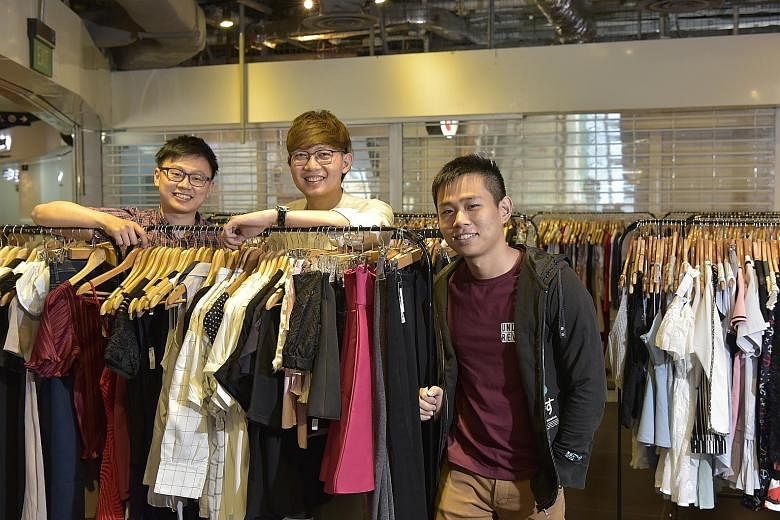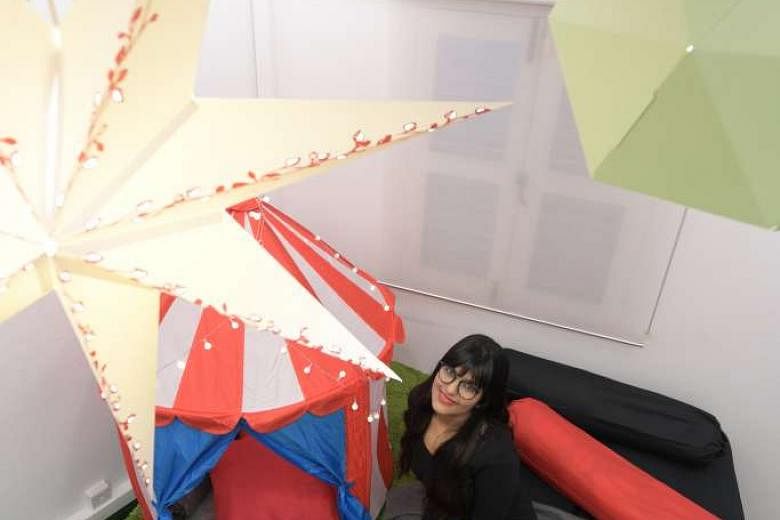1 Buying second-hand clothing like they're new
REFASH
One of these new entrants is fashion portal Refash (refash.sg), which helps women buy and sell second-hand clothes.
"We help women sell in the simplest way possible - they stuff all their unwanted clothes into a bag and send it to us, and we'll handle the rest," says co-founder and chief executive Aloysius Sng, 29.
It curates and processes the items, which are listed online or stocked at its brick-and-mortar stores.
Sellers receive a cut of the sales. This ranges from 30 to 70 per cent, with a bigger cut if they sell more.
"The feeling I want to give people is that they're shopping for like- new items," says Mr Sng.
The Singapore Management University graduate decided to start the company in late 2015 after noticing that his girlfriend "did not wear more than 70 per cent of what's in her closet" despite having a "bursting wardrobe".
"With shortening trends and how fast fashion moves nowadays, brands are putting out new designs faster than ever and consumers are buying fast fashion faster than ever.
"It's a real problem because... much of that eventually goes to the landfills," he adds.
The company opened its flagship store at Suntec City in December, with outlets in The Cathay and City Plaza. A fourth outlet will open this month at PoMo mall.
Its first overseas store is expected to open in Kuala Lumpur's Sungei Wang Plaza this month. After establishing a presence in Malaysia, the company will look to the Philippines and Indonesia, Mr Sng says.
Sales have been climbing steadily every month and hit $80,000 for December. The company is now serving about 1,400 sellers and has a waiting list of 2,000 more.
Refash will soon a launch a feature allowing sellers to list their own items for sale, Mr Sng says.
"People can take their own photos of the item, we will then clean up the image and post it on the site. When the item is sold, we will mail the seller a polymailer with postage pre-paid and the buyer's address printed. The seller just needs to put the item in and mail it," he says.
The aim of Rehash is to widen the spectrum of consumers willing to purchase second-hand clothing, as well as the pool of sellers.
"We want to inspire a new generation of consumers to consciously think second-hand first when it comes to fast fashion," he adds.
2 A bridge between craftsmen and buyers
EFAISTO
Several up-and-coming e-commerce players are reaching out to small retailers and designers who previously had no online presence.
Efaisto, co-founded by Belgian Bernard Seys and Frenchman Lou-Adrien Fabre, is an e-commerce marketplace that allows buyers to order made-on-demand items from a curated selection of artisans.
The firm is headquartered in Singapore but has the bulk of its operations in Vietnam, where the artisans it works with are located.
The two co-founders were working in Ho Chi Minh City for multinational firms when they came across craftsmen who make quality clothes, belts, wallets and other accessories.
"We spent a lot of time there having wardrobes tailor-made. We enjoyed the whole process, and knowing that the money we paid went straight to the artisans' pockets," says Mr Seys.
"It occurred to us that this is out of reach for most of our peers back home, so we decided to do something about it."
The pair quit their jobs to set up Efaisto, which was launched in May last year.
The company's role as a bridge between craftsmen and buyers means curating artisans for quality is "extremely important".
"To source for artisans, we travelled on motorbikes in Ho Chi Minh City into small alleys in neighbourhoods that expats usually never go to," says Mr Seys.
The company is now working with 40 artisans in Vietnam with the goal of increasing this number to 200 by the end of this year.
"All products are custom-made - designed and made just for the buyer. It's ethical - people know who the artisan is and also the amount he or she is receiving out of the total price.
"It's a new way to consume and is also more ecologically friendly because there's no waste. We also remove intermediaries in the value chain," adds Mr Seys.
The company has made just under 1,000 transactions so far.
It is in the process of fund raising and expects to raise US$500,000 (S$719,000) by June. This will be used to grow its base of artisans in Vietnam, with the aim of eventually sourcing for craftsmen elsewhere in South-east Asia, such as in Thailand and Indonesia.
3 E-tailer's tech system helps others grow
ZILINGO
Thailand-based online retailer Zilingo is working to help small fashion, beauty and lifestyle businesses in the region expand their global reach.
"Micro-entrepreneurs are at the heart of the business," says co-founder and chief executive Ankiti Bose. "They work hard to push their small businesses ahead and are getting left behind as retail becomes increasingly digitised."
Many such companies are online only by way of social media platforms such as Facebook and Instagram, "which are not platforms for business", says Ms Bose.
"There's no mentoring, working capital loans or logistics services on these platforms... Sellers need a backend system as well as a storefront to go online."
To fill this gap, Ms Bose started the company in 2015 with co-founder Dhruv Kapoor after a trip to Bangkok - a city well known for its diverse retail scene and independent designers.
"I realised people from all over the world were coming here to shop, and wondered: 'Why is it not online?' "
About 60 per cent of all fashion and lifestyle retail in South-east Asia happens through these fragmented sellers and less than 3 per cent of them are online, she adds.
Zilingo built its own backend software system, which allows sellers to use their own language, and has managed to grow rapidly on the back of an "asset-lite" model.
"We don't own any warehouses or delivery vans, unlike some of our competitors," says Ms Bose. "We're the tech layer which helps make business more efficient.
"That's part of the reason why we're scaling (up) so fast. Our kind of business requires less capital."
The company is now working with over 2,000 sellers from Thailand and Singapore, and is launching its Indonesia operations this month. In Singapore alone, the platform has signed on about 400 to 500 sellers, about half of which are fashion retailers.
Zilingo has more than a million users across geographies and sales are growing 30 per cent month-on-month, says Ms Bose.
About 20 per cent of the business comes from outside sellers' home regions. This means, for instance, Singapore retailers selling to buyers abroad. "Sellers see us as a way to expand regionally and globally," she adds.




